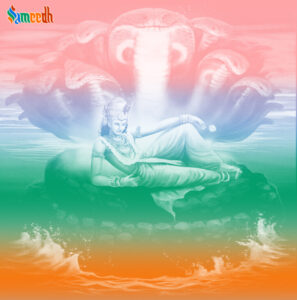The Word “Shesh” comes from the Sanskrit language, which translates to “that which remains”. This means that SheshNag exists even after everything has ended. SheshNag is a cosmic serpant who is believed to support all the planets of the universe on it’s thousand heads.

Sheshnag, also known as Ananta Shesha or Adi Shesha, is a prominent deity in Hindu mythology and is often represented as a multi-headed serpent with a coiled body. Sheshnag holds a significant place in Hindu cosmology and serves various roles in Hindu beliefs, including:
- Cosmic Serpent: Sheshnag is believed to support the entire universe and is sometimes referred to as the “cosmic serpent” or “infinite serpent.” The coils of the serpent are said to represent the cycles of time and creation.
- Lord Vishnu’s Couch: Sheshnag serves as the divine couch or bed for Lord Vishnu, one of the principal deities in Hinduism. Lord Vishnu is often depicted reclining on the coiled body of Sheshnag in the form of Ananta Padmanabha or Ananta Sayana, signifying the preservation and protection of the universe.
- Steward of the Earth: In some traditions, Sheshnag is believed to uphold the Earth on his hoods, preventing it from sinking into the cosmic ocean.
- Symbol of Endlessness: The name “Ananta” means “endless” or “infinite,” reflecting the idea of time and the universe being boundless and eternal.
This mystical 5 headed-snake stands with its fangs open over the head of Lord Vishnu. The coiled body of the snake forms the throne on which Lord Vishnu is reclining. This snake is worshipped by Hindus as it is the seat of Lord Vishnu.
